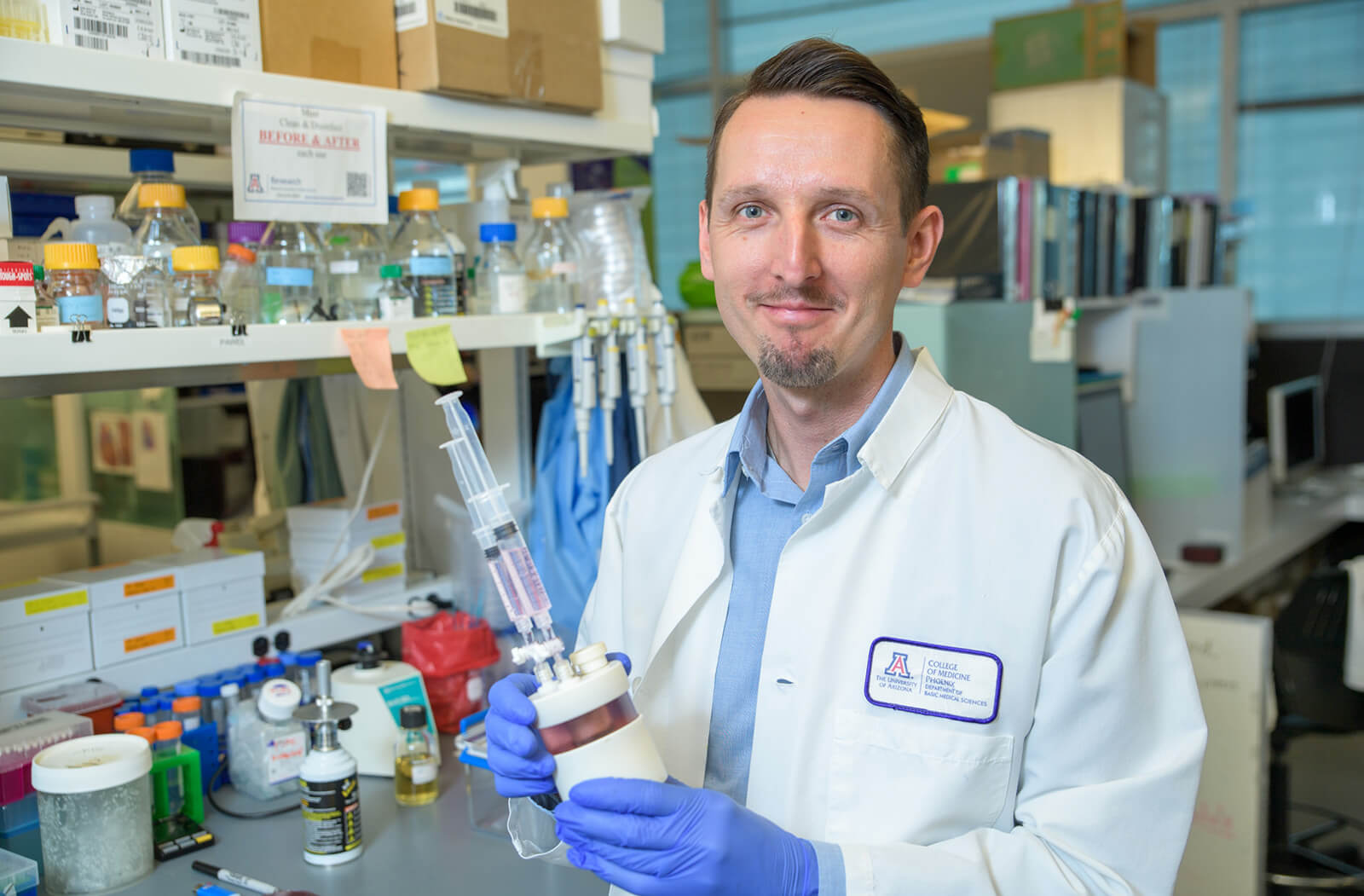
Grant to Research Impact of Bacteria Associated with Cervical Cancer on Women’s Health Outcomes

Paweł Łaniewski, PhD, an assistant research scientist in the Department of Basic Medical Sciences at the University of Arizona College of Medicine – Phoenix, is one of eight researchers to be awarded a grant by the Arizona Department of Health Services, Arizona Biomedical Research Commission (ABRC). Dr. Łaniewski received an Arizona New Investigator Award (NIA) for $225,000 over three years.
Dr. Łaniewski is a trained microbiologist and bacteriologist whose research interest in host-microbe interactions and the microbiome has centered around improving women’s health. As a member of the Herbst-Kralovetz Laboratory — led by Melissa Herbst-Kralovetz, PhD, associate professor of Basic Medical Sciences and Obstetrics and Gynecology — Dr. Łaniewski studies the impact of the microbiome on various gynecologic and reproductive conditions — in particular, cervical cancers.

From there, they examined how that bacterium effects the reproductive tract, putting women at higher risk of HPV infection — which can ultimately lead to cancer — as well as the how that infection progresses.
The clinical studies highlighted the association between the bacteria and the disease, but “We still don't know what that bacterium does,” he said. “We really want to better understand this emerging pathogen.”
Using a three-dimensional (3D) model of the human cervix, Dr. Łaniewski will inspect how two key species belonging to the Sneathia genus mechanistically alters the model, which will allow him to determine the impact of these bacteria on host defense, physiology and metabolism. “In our preliminary study, when we infected the 3D models with S. amnii, we saw that this bacterium can cause some inflammation, as well as changes in the barrier or cellular function, which suggests a high pathogenic potential” he said.
And it truly is an area of immense need. Approximately 13,000 new cases of cervical cancer are diagnosed each year in the United States. Nearly 4,000 women die of this cancer, according to the Centers for Disease Control and Prevention. In addition, Hispanic women have the highest rates of developing cervical cancer and Black women have the highest rates of dying from it.
Zeroing in on exactly how Sneathia functions will be critical to translating care in the future. Along with its connection to cancer, other researchers have seen that it can cause preterm birth, postpartum infection and chorioamnionitis (acute inflammation of the membranes and fetal portion of the placenta).
Dr. Herbst-Kralovetz also received a grant from the ABRC for her research on the development of non-invasive diagnostics, enabling early detection of endometrial cancer. Dr. Łaniewski is working with her on that project, as well. Their work together has explored a myriad of pressing women’s health issues.
Her mentorship has been invaluable to his career. Beginning as a postdoctoral research associate in 2015, he was able to witness, “How passionate she was about women's health and understanding how under researched and underfunded this field is. It was infectious. She has been an amazing mentor for me,” he said.
About the College
Founded in 2007, the University of Arizona College of Medicine – Phoenix inspires and trains exemplary physicians, scientists and leaders to advance its core missions in education, research, clinical care and service to communities across Arizona. The college’s strength lies in our collaborations and partnerships with clinical affiliates, community organizations and industry sponsors. With our primary affiliate, Banner Health, we are recognized as the premier academic medical center in Phoenix. As an anchor institution of the Phoenix Bioscience Core, the college is home to signature research programs in neurosciences, cardiopulmonary diseases, immunology, informatics and metabolism. These focus areas uniquely position us to drive biomedical research and bolster economic development in the region.
As an urban institution with strong roots in rural and tribal health, the college has graduated more than 1,000 physicians and matriculates 130 students each year. Greater than 60% of matriculating students are from Arizona and many continue training at our GME sponsored residency programs, ultimately pursuing local academic and community-based opportunities. While our traditional four-year program continues to thrive, we will launch our recently approved accelerated three-year medical student curriculum with exclusive focus on primary care. This program is designed to further enhance workforce retention needs across Arizona.
The college has embarked on our strategic plan for 2025 to 2030. Learn more.